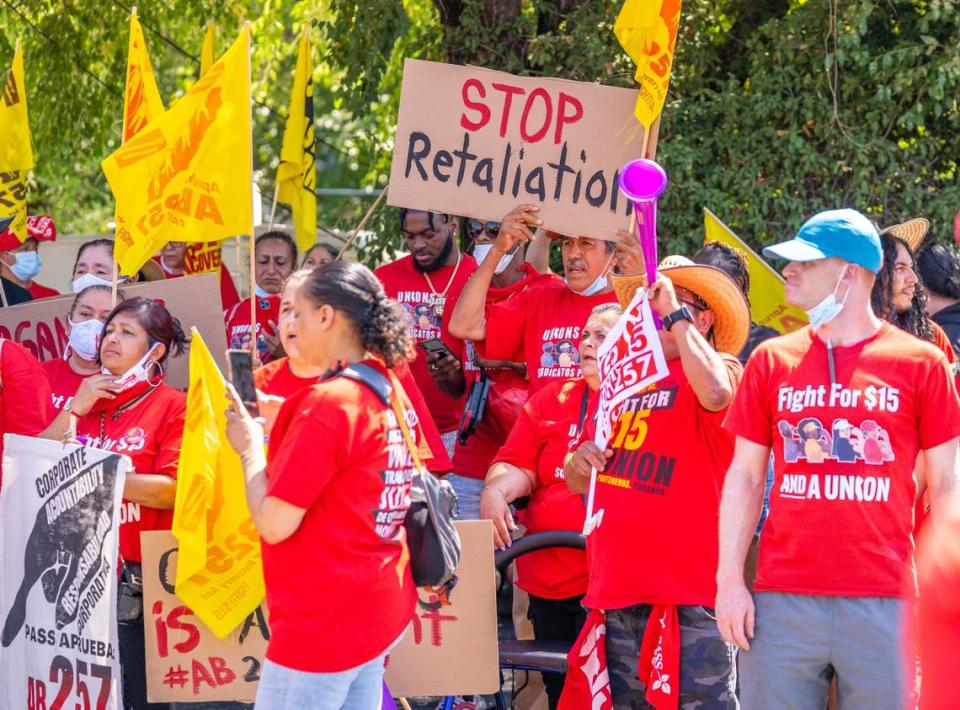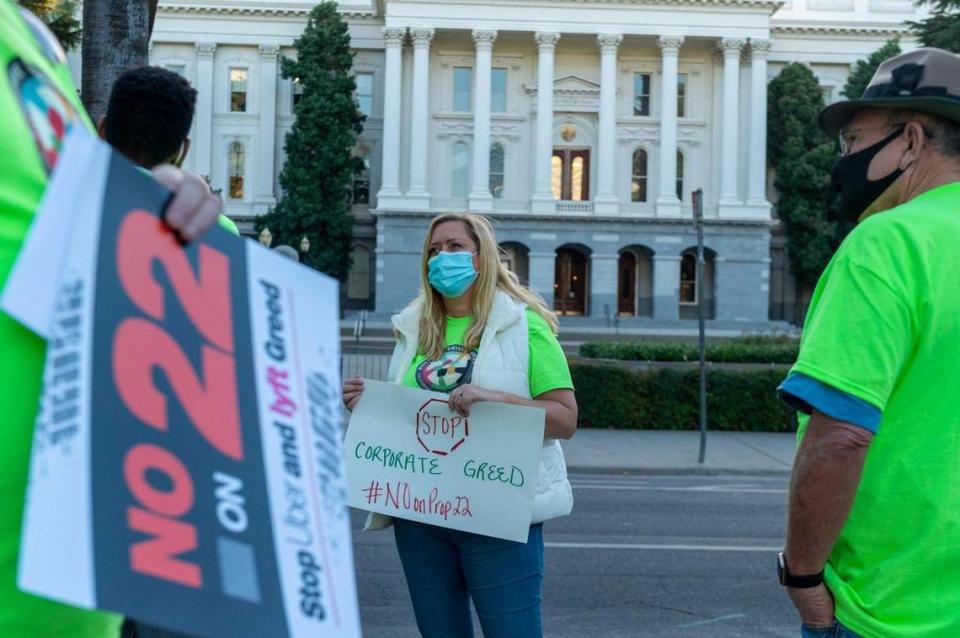California unions want to limit paid petitioners who mislead voters in ballot measures
California’s powerful labor unions, environmentalists and good governance groups often characterize the state’s ballot measure process as a tool for wealthy interests to undermine changes passed by the state’s left-leaning legislature.
They hope new legislation will put more power in voters’ hands.
Assembly Bill 421, sponsored by Assemblymember Isaac Bryan (D-Los Angeles), would make it harder for campaigns to mislead voters while gathering support for statewide ballot referendums and certain initiatives that seek to alter existing legislation.
The bill lays out new certification requirements for paid signature gatherers, compels campaigns to clearly disclose their top three funders, and mandates that at least 10% of signatures be gathered by volunteers. Paid signature-gatherers have come from out of state to make upwards of $10-$15 per signature, according to the bill’s supporters.
The new rules would apply to statewide referendums and “referendum look-alikes” — ballot initiatives that seek to alter or repeal legislation passed within the last two years. The bill would’ve applied to initiatives like Proposition 22, which carved up a newly passed California labor law by excluding gig drivers from classification as full time employees.
“I believe everybody should have a voice in their democracy,” said Bryan on a press call Monday morning. “When you are paying signature gatherers to lie to folks in a process that’s already designed to be confusing, you’re going to hurt the will of the general public.”
Are California ballot measures a ‘parallel legislature’ for wealthy interests? Labor thinks so
Bryan’s bill represents the latest move in an ongoing battle between the unions and wealthy interests at the statehouse.
Unions, buoyed by Democratic supermajorities in the California Assembly and Senate for most of the last decade, have secured a series of significant victories in recent years. In reaction, they say, corporations and wealthy conservative groups have leveraged the state’s direct democracy process as a “parallel legislature” to walk back some of those gains.
In 2020, for example, app-based gig companies poured more than $200 million into a ballot initiative that partially repealed a state law that would have required them to provide more employment benefits to workers.
That same year, the state’s billion-dollar bail bond industry followed the same playbook, spending $7.5 million on a referendum that voided reforms to California’s cash bail system. The target was a law that abolished the practice of forcing detained suspects to pay cash for pretrial release and instead established risk assessments as a more equitable solution.
Tobacco companies and oil conglomerates have also used the referendum process to delay implementation of laws and squeeze out more profits.
But change won’t come easily in a state whose courts rarely take a stance against voters, and who just recently dealt labor significant blows in their fights against Prop. 22 and the referendum on the law that created the state’s fast-food council.
“Reforming or changing the initiative process is very difficult,” said David McCuan, a political science professor at Sonoma State University and an expert on direct democracy. “It’s more likely that we change the death penalty in this state than we alter the ballot measure or direct democracy process.”
Business groups are expected to vigorously oppose the bill.
“While we agree with additional transparency measures for signature gathering to ensure voters are well informed, this proposal is clearly meant to limit the public’s voice in California’s system of direct democracy,” said Jennifer Barrera, president and CEO of the California Chamber of Commerce, in a statement.
Protect App-Based Drivers and Services, which supports Prop. 22, deferred to the Chamber for comment. Save Local Restaurants, which represents the fast food industry, has not yet responded to requests for comment.
The bill’s proponents say their reform effort responds to the series of referendums and initiatives sponsored by fast-food corporations, oil and plastics conglomerates and bail bond companies that stymie progressive policies passed by the Democratic-controlled legislature.
The Service Employees International Union, a lead sponsor of the bill, submitted complaints to the Attorney General’s office last year that accused paid petitioners of lying to voters while circulating referendum petitions to overturn the state’s fast-food council.
The Secretary of State would enforce the bill’s new requirements, establishing registration requirements and training for paid signature-gatherers. Counties would be responsible for maintaining the list of registered paid petitioners.
The bill also seeks to crack down on what it calls the “wild west” of paid signature gathering. Signature-gathering firms would have to submit to training and certification through the Secretary of State’s office. Every individual circulator would have to complete training and then register with a unique identification number. The petitioner would be required to wear their number clearly when out in the field, and each signature gathered could be traced back to the person who collected it.
The petitioners would have list the top three funders of the initiative clearly at the top of each signature page. Additionally, voters would need to initial and date next to their names attesting that they were shown a list of top funders before signing.
Bryan said that since the bill doesn’t make “fundamental changes” to the state’s constitution, he doesn’t believe it wouldn’t have to face the voters as its own ballot initiative.
“We have fine-tuned features of our democracy many times throughout the years,” Bryan said. “This is one of those instances that I think is appropriate and timely and responsive to the needs of today.”
But McCuan thinks this avoidance of the voters could indicate that the bill’s supporters know the public wouldn’t approve it if it made its way to the ballot.
He added that the bill was an admirable effort from labor who likely feels their grip on power slipping after recent losses on Prop. 22 and the fast-food council. But trying to push through so many changes in a single bill could prove challenging and even backfire if it does become successful. Introducing volunteer signature-gatherers will likely decrease the validity rate, McCuan said, which means paid signature-gatherers will have to work extra to gather even more signatures to make up the difference.
“That’s going to make it more expensive,” he said, “and that’s an unintended consequence.”
McCuan also questions how the bill will implement many of its provisions and navigate a state court system that has historically shown deference to California voters. Limiting paid signature-gatherers could also face lawsuits over infringement of free speech, McCuan predicts.
“What is 10%? Is it 10% of the total needed to qualify?” McCuan said. “There’s a whole bunch of implementation questions that come with that that a court would have to wrestle with – and they don’t want to wrestle with those questions.”


